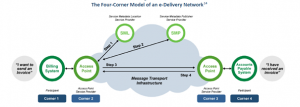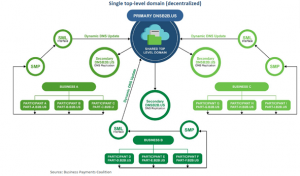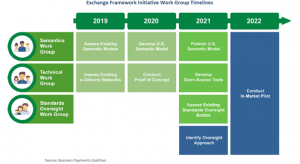In early July 2021 the Business Payments Coalition (BPC) in cooperation with the Federal Reserve has announced the pilot program (e-Invoice Exchange Market Pilot), which aims at building an e-Invoicing network to be tested across businesses in the US.
Like many other jurisdictions, the US has started the switch to paperless invoicing for B2G transactions. It should be noted that the US’s e-Invoicing regulatory storyline dates back as far as 2017, when the Office of Management and Budget (OMB) issued an e-Invoicing Memorandum, on the basis of which US federal government bodies were expected to implement e-Invoicing processes before the end of 2018. This goal has been achieved only partially, with barely 50% of all government invoices reported as having been processed electronically.
The idea behind this is to implement a system where the invoices can be exchanged freely and electronically, irrespective of the systems being used by particular counterparties. This recalls, for example, the globally established PEPPOL model, which standardizes the structure of an invoice. It has also emerged quite clearly, from the statements made by BPC representatives, that existing e-Invoicing models (including the European one) serve as a point of reference for creating the US model.
It is worth underlining that the greatest challenge for US e-Invoicing is the existence of more than 40 different standards for e-Invoicing, which makes it a difficult solution to use, especially for smaller entrepreneurs. Therefore, full standardization of the e-Invoicing process seems the only viable solution on the table.
e-Invoicing solutions in the US
The concept being adopted as proposed by the BPC includes the two main pillars. The first one is the messaging infrastructure, i.e., the connection model that allows various businesses to exchange information in a standardized form. The second is the semantic model, which refers to the structure of the information included in the e-Invoice, which should be clear and legible for the parties exchanging the information, and using a common language. Based on these pillars, full integrity will be achieved allowing fast and effective e-Invoicing processing across all sectors (B2B, B2G, and G2B). BPC is working in parallel on both pillars via separate dedicated working groups, with the market pilot bringing their work together to create the exchange framework.
The US e-Invoice exchange framework will be based on a four-corner network model that defines the technical, business, and legal requirements for achieving interoperability between stakeholders (invoice senders and receivers) using registered service providers and platforms. By using defined registers (like SML, SMP, which uniquely identify both the participants and their addresses in the network) their capabilities in terms of acceptable types and formats, for example, will be recognized. This model is commonly recognized and used in Europe.
The US Federated Registry Services Model
However, the model that is intended to be applied in the US had to be adjusted to the specific administrative structure that exists in the US. Following the proof-of-concept study, which was launched back in 2019 and finalized in the first quarter of 2021, it turned out that BPC recommended the Federated Registry Services management model as being a more feasible and accessible approach for the US market (rather than the EU’s centralized registry management model). This model assumes that the registry services (SML, SMP) are managed by multiple authorities instead of a single central unit.
Such a decentralized model resembles an email system, in which users can register with various providers and later be identified through the email network. Similarly, the Federated Registry Services model will allow authorized administrators (operators) to register and onboard participants into the e-Invoice framework and enable suppliers and buyers to exchange e-Invoices via Access Point providers. As with the email-based system, counterparties will be identifiable and searchable using a unique address (network location).
US e-Invoicing market pilot phase
The US has just started the market pilot phase that is supposed to be in operation in 2022. In a recent development (the Expression of Interest Form), the BPC invited interested stakeholders to actively participate in the creation, implementation, and operation of the exchange framework and to test the e-Invoicing environment. In particular, the BPC is looking for Access Point implementation parties, developers, and testers for open-source tools to help with onboarding, access points, and registry services, as well as companies willing to test the e-Invoicing system, and bodies willing to supervise and monitor the establishment and the testing of the e-Invoice exchange framework.
During the upcoming 18 months or so, the testing e-Invoice environment will be finalized and then properly tested, which is expected to be finalized by the end of 2022.
In a nutshell, the US is following the European e-Invoicing model based on open interoperability functionality, which is system agnostic, meaning that it enables parties using various invoicing systems to easily connect and exchange documents through the e-Invoicing network. It would be a great step forward for US businesses which, even if they are already using e-Invoicing systems, are limited to sector-specific e-Invoicing environments and unable to effectively exchange invoices with counterparties that use a different e-Invoicing system or provider. Under the new model this would change and full interoperability will enable widespread e-Invoicing implementation, eventually bringing significant benefits in terms of processing time and cost savings.








